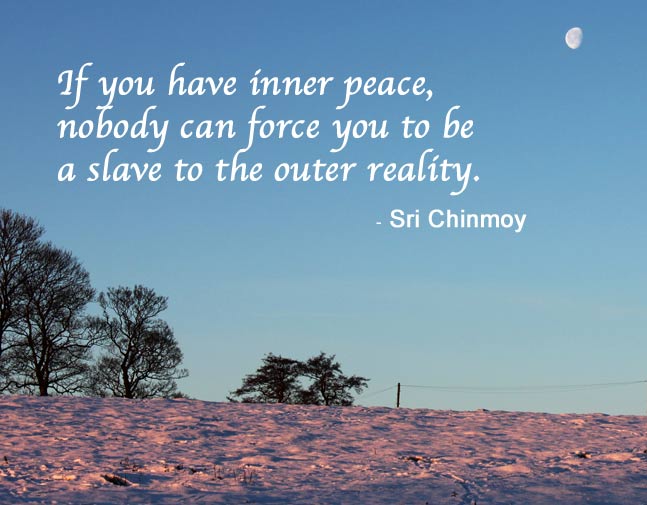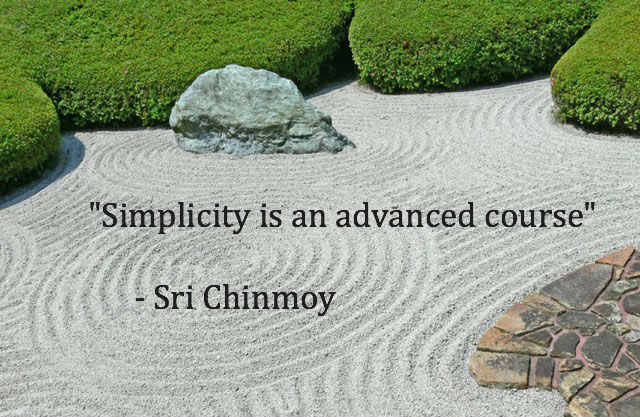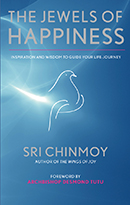Every day there is only
One thing to learn:
How to be honestly happy.

10 Easy Ways to Reduce Stress in Your Life
It’s rare to meet someone in modern life who doesn’t complain about the amount of stress that they feel. However, there is no reason we have to put up with this unnecessary stress; to a large extent it is up to us whether we allow our lives to be dominated by stress and worries. Rather than struggling through life with layers of stress, we can definitely take a different approach.
These are ten easy ways to reduce stress in our lives.
- Meditate. Stress is the accumulation of thoughts that revolve around our mind. We feel stressed only because our mind becomes dominated by negative and stressful thoughts. Meditation teaches us how to let go our of thoughts and cultivate a quiet mind. If we can learn to dive deep within, our mental worries and fears will evaporate. No matter where we are, the inner peace that we gain from meditation will be a reserve that we can draw on in times of potential stress. As Sri Chinmoy says: “If you have inner peace, nobody can force you to be a slave of the outer reality.” [1]
- Do one thing at a time. It is easy to put pressure on ourselves, thinking we need to try and do several things at once. However, this multi-tasking will make us stressed. From a practical perspective, this means we may fail to do anything well. Rather than holding several problems in our mind at once, take issues one at a time. Decide which is the highest priority – deal with that as well as you can, and then move on to the next problem.
- Reduce desires. If you want to be happy and less stressed, try reducing your expectations and desires. Rather than endlessly striving to please your boss or make money, be willing to accept a happy medium. Making money isn’t the only priority in life. If we diminish our desires, then immediately we will feel our self-imposed stress evaporate.
- Don’t take on others’ burdens. We have enough problems of our own without taking on others’ troubles as well. Furthermore, we cannot really solve another person’s problems. Taking on their stress doesn’t help them; it only adds to our stress. This doesn’t mean we will be indifferent to the fate of others. No, we shall seek to offer good will and practical help, but it can be done with a sense of detachment; it doesn’t help to worry on their behalf.
- Learn to say no. If we feel there is too much going on in our life, we have to look at whether what we are doing is really necessary. Do we find ourselves doing things just because we dare not say no? If people ask us to take on unnecessary responsibility, we have to be confident and willing to say no. There is no point in becoming stressed just because we are trying to please other people. read more…

How to Make Others Happy
Usually, we are concerned with how to make ourself happy, but ironically one of the best ways to gain satisfaction and fulfilment is to help others find a path to happiness. These are a few suggestions to help make others happy.
Be happy yourself. We tend to share whatever we have. If we are unhappy or frustrated, we either consciously or unconsciously share that with other people. If we can be cheerful and positive, this will be the best contribution to helping others feel it too. There is an old saying that joy is contagious. If we can cultivate happiness, we will see how it spreads to other people.
Wish happiness for others. The human mind often unconsciously feels resentment when others are happy. It is difficult to see others happier or more successful than we are. This is the lower human nature of jealousy, pride and other undivine qualities. To sincerely wish for the happiness of others is a very important step. If we can always remember to offer good will and happiness to others, then we will really be able to make both ourselves and other people happy.
Listen and don’t judge. We don’t make others happy by telling them all their weakness and what they need to change! This will simply hurt them and make them defensive. If we see a friend in trouble, sometimes we simply need to listen without judgement.
“Be kind, be all sympathy,
for each and every human being
is forced to fight against himself.”
– Sri Chinmoy ((Twenty-Seven Thousand Aspiration-Plants, Part 129, Agni Press, 1990.))
Listening to others helps them find their own solutions and see a way forward. If we can avoid judging or telling someone else what to do, then that person may eventually become ask us for some practical advice. If we see someone doing something that is clearly taking away their happiness, we may be able to find a way to help them without sounding harsh and judgmental. But first we need to gain their trust by being sympathetic.
Acceptance not expectation. We place a big burden on other people when we have high expectations of them. Parent often expect their children to live a certain way. Even friends may have strong expectations. These expectation can easily lead to frustration for both us and our friends or relatives. To make others happy, we have to respect their choices and accept their character. If we are always expecting to change them or “improve” them, then we will be strangling their sense of freedom. But, if we can value their aspirations – even if they differ from our own – then they will be grateful to you and feel free to follow their own way.
Appreciation. There is a big difference between sincere appreciation and flattery. If we flatter other people, we may think we are pleasing them, but really it is a false happiness because we are just boosting their ego. However, if we appreciate others in a sincere way, then they will definitely be happy. Everyone likes to have some recognition and appreciation. Appreciation means taking the time to recognise the good achievements and good intentions of other people. However, don’t appreciate only those who are very popular already. Many people who are doing good things may be wholly unappreciated, and if we offer them our gratitude and recognition, it will definitely inspire them to continue doing good things. Rather than flattering their ego, our appreciation can be given in order to thank them for what they have done and to encourage them to do more.
Give. The real secret to making others happy is giving. On a very basic level, this can be giving material gifts or financial help. This has its place, though we have to be careful. Some parents who spoil their children with monetary gifts, fail to give much more important qualities like love and concern. True giving is self-giving, which means giving unconditionally with a feeling of oneness. If we are willing to selflessly give our time and genuine concern, then we can help others to grow into their highest self. Self-giving doesn’t mean we give in to the demands or desires of others. Fulfilling their desires may not make them or us happy. Sometimes self-giving means rejecting their demands while showing them there may be a better way to happiness. If we have an attitude of genuine self-giving, we won’t have feelings of superiority or inferiority – only a feeling of oneness and genuine wishes for others’ happiness.
Don’t worry; have faith. Parents may love their children, but at the same time strangle them with worry and concern. This anxious kind of love is unhealthy for both parties. We should love with a certain detachment, as excessive worrying won’t keep them from harm or make them happy. If we can cultivate faith within ourselves, we will provide our loved ones with the strength and courage .
The wonderful secret in helping other people find their own path to happiness is that it is one of the most effective ways of creating our own inner happiness. If you are struggling to be happy yourself, try smiling and making others happy. It really works!
Related

Unexpected Happiness
Over the years, you pick up on society’s preconceptions of what should give you happiness and what shouldn’t. But when you evaluate what really gives you happiness, you become aware that happiness can often come from unexpected sources; and what we expect should give happiness often disappoints.
I remember when very young, I would spend weeks and weeks getting excited about Christmas. The only reason for the great excitement was all the presents that I hoped would come my way. I remember one particular Christmas morning being terribly unhappy. My assortment of socks, woolly jumpers and “improving” books were not at all what I had wanted. It proved an early lesson in the realisation that the expectation of material goods could easily lead to disappointment and unhappiness.
These days, I no longer expect a big sack of presents from Santa, but Christmas has become a particular favourite time of the year. What I enjoy about Christmas is the fact the world slows down. There is no need to work, no need to check my emails and all those little things of modern life (which are supposed to make our lives easier, but actually seem to increase tension). For a few days over Christmas, there is that freedom to switch off from the demands of our work. There is more time for music, reflection and meditation. I find at Christmas, my meditation improves markedly. Quite often, my early morning meditation is slightly compromised by a list of things to do – nagging at the back of my mind. But, when you can really switch off – contemplation and meditation come much more easily.
The Christmas vacation reminds us how a slower pace of life can afford the opportunity to discover real happiness. But happiness isn’t just to be found in a slower pace of life. In fact, an even greater happiness can be found when we find ourselves in the maelstrom of life seeking to offer something to like-minded people.
When we think of our happiness, we tend to think in terms of what can we receive. We perhaps think of ourselves in a comfortable situation, with nice things happening to us. But one of the most valuable lessons I learnt from my spiritual teacher, Sri Chinmoy, is that our happiness can be magnified when we forget about our self and are in a position to offer something to others. If we grasp at happiness for ourselves, it eludes our grip. But, if we forget our own happiness and seek to serve others – happiness seems to come effortlessly.
‘We have to live in the root and this root is happiness. How can we live in the root all the time? We can live in the root only by self-giving: giving what we have and what we are.’
Sri Chinmoy [1]

Simplicity Is an Advanced Course
Simplicity
is an advanced course.((Unsourced))
This saying from Sri Chinmoy encapsulates the paradox of simplicity: To enjoy the fruits of simplicity, we need to work hard to overcome our mind’s tendency to complicate, confuse and misunderstand.
Simplicity should come easily, naturally and spontaneously. But over the years, most of us have generated habits of thought and action that have caused us to forget this wonderful quality.
Real simplicity can have a liberating and calming effect on our life; simplicity has the power to overcome mental tension and create a climate of inner peace. A child can know and understand simplicity; it hasn’t yet developed the habit of complication and suspicion. If we are weighed down by the stresses and strains of life, how can we remember and re-vitalise our capacity to enjoy simplicity? Here are some tips to enjoy the fruits of simplicity.
Value simplicity
If we wish to achieve anything worthwhile in life, we need to value it. Because we value eating so much, we never miss a meal. If we value simplicity, we will always keep it in the forefront of our mind; and then when a choice presents itself between complication and simplicity, we will remember to pursue simplicity.
The power of the heart and spontaneity
If you have a train of thoughts going around in your mind, it can be confusing and difficult to come to a conclusion. But there is another part of us that can transcend the confusion of the mind. If we use the power of the heart, our intuition can come to the fore. Even though intuition is usually ignored until after the fact, it somehow knows what we should do. We need to learn to trust this part of ourselves and follow the quiet voice of our intuition. The heart, which opens the door to intuition, embodies a wonderful simplicity in contrast to our mind, which usually embodies complexity and uncertainty. Sometimes, we just need to think a little less and listen a lot more to our inner intuition.


